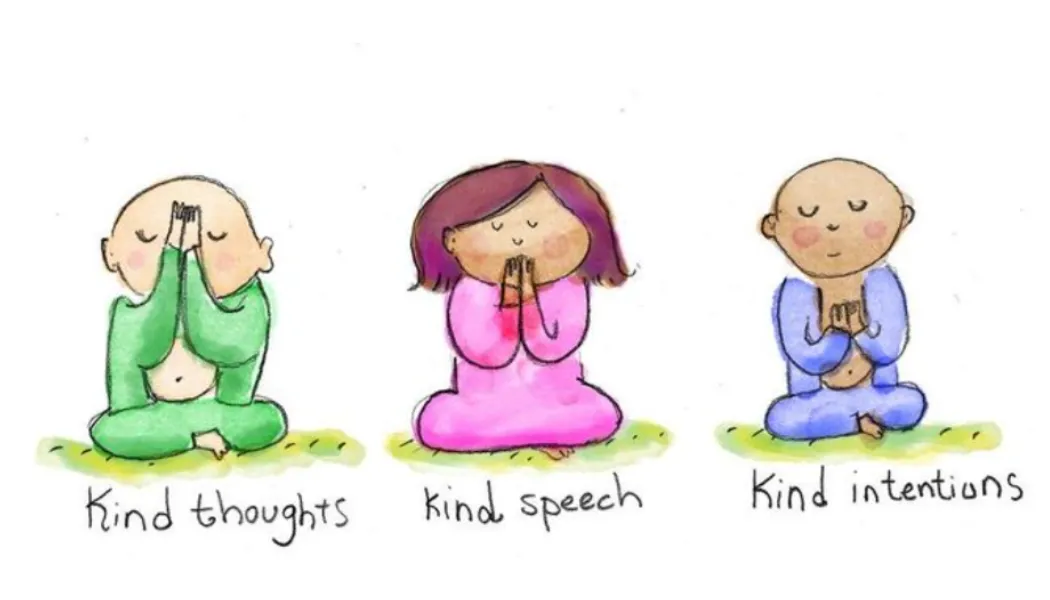In a world constantly rushing forward — buzzing with deadlines, digital noise, and everyday challenges — kindness can feel like a soft whisper easily drowned out. Yet, it is often this very whisper that brings clarity in chaos, comfort in difficulty, and connection in isolation. The sweetness of a kind thought, the warmth of kind speech, and the sincerity of kind intentions can transform not only our personal world but also the world we share with others.
The illustration you provided — three peaceful figures sitting calmly with the words “Kind thoughts, Kind speech, Kind intentions” — beautifully captures the essence of mindful kindness. It’s simple. It’s gentle. And it holds profound wisdom.
This article takes that wisdom and expands it into a meaningful exploration of kindness as a philosophy, a daily practice, and a way of building a more positive, more compassionate society.
Table of contents
- The Three Pillars of Kindness
- 1. Kind Thoughts: The Seed of Compassion
- 2. Kind Speech: The Bridge Between Hearts
- 3. Kind Intentions: The Heart of Genuine Goodness
- The Ripple Effect of Kindness
- Kindness as a Daily Ritual
- Why the World Needs These Three Practices Today
- How These Three Pillars Transform You
- Kindness Toward Yourself
- A Gentle Reminder
- Conclusion: The Quiet Revolution of Kindness
The Three Pillars of Kindness
At the heart of the illustration lie three simple yet powerful principles:
1. Kind Thoughts
2. Kind Speech
3. Kind Intentions
Together, they form a guide for conscious living — a way of aligning the mind, voice, and heart with goodness. These three pillars come from ancient teachings found in mindfulness practices, Buddhism, and universal moral philosophies, yet they remain deeply relevant today.
Let’s explore them in depth.
1. Kind Thoughts: The Seed of Compassion
Every action begins in the mind. Every emotion, every reaction, every decision — all of it sprouts from a thought. When thoughts are unkind, harsh, or judgmental, they don’t just stay inside us; they ripple outward in the form of anxiety, impatience, irritation, or negativity toward others.
But when our thoughts are gentle, compassionate, and understanding, the ripple goes in a different direction — creating calmness within and peace around us.
What Are Kind Thoughts?
Kind thoughts are not about pretending everything is perfect. They are not forced positivity. Instead, they are:
- Thoughts that create understanding rather than criticism
- Thoughts that promote patience rather than frustration
- Thoughts that encourage empathy rather than assumption
- Thoughts that give ourselves grace rather than guilt
- Thoughts that allow others space rather than judgment
A simple example:
Instead of thinking, “That person is so annoying,” try “Maybe they’re having a difficult day. I’ve been there too.”
This small shift doesn’t just change how you see others — it changes how your body feels. Stress softens. Tension melts. A calmer mind leads to a calmer life.
Why Kind Thoughts Matter
- They shape your mindset
- They influence your emotional wellbeing
- They affect how you treat others
- They reduce inner conflict
- They build resilience
A mind filled with kinder thoughts becomes a more grounded mind — one that is not shaken easily, not overwhelmed quickly, and not closed off by negativity.
How to Practice Kind Thoughts Daily
- Pause before reacting
Notice the first thought. Then choose a better one. - Challenge your assumptions
Ask: “Is this thought true, or am I reacting too quickly?” - Wish well
Mentally wish others peace, even silently. - Use self-compassion
Replace “I’m failing” with “I’m learning.” - Practice gratitude
Focus on what’s working, not only what’s missing.
Kind thoughts are seeds. Sow them consistently, and your inner world transforms.
2. Kind Speech: The Bridge Between Hearts

Words shape relationships. They can tear people apart or bring them together. They can heal or hurt. They can encourage growth or shut it down.
Kind speech means choosing words intentionally — with warmth, clarity, and understanding.
What Is Kind Speech?
Kind speech is not flattery or avoidance of difficult conversations. It is:
- Speaking honestly, but with care
- Communicating with respect, even in disagreement
- Using words to uplift, not belittle
- Listening before speaking
- Choosing tone deliberately
- Speaking in ways that reduce harm
Sometimes, kind speech is soft. Sometimes, it is firm. But it is always rooted in respect.
Why Kind Speech Matters
- It strengthens relationships
- It reduces misunderstandings
- It promotes emotional safety
- It creates harmony at home and work
- It sets a tone that others naturally mirror
When someone speaks to you kindly, what happens?
Your shoulders lower. Your breath deepens. You feel seen.
When you speak kindly to others, you create that same effect.
How to Practice Kind Speech Daily
- Think before speaking
Ask: “Will my words heal, help, or harm?” - Use “I” statements
Instead of “You always…” try “I feel…” - Speak with patience
Not every moment requires a quick response. - Offer encouragement
Even small affirmations matter. - Avoid gossip or unnecessary criticism
What you say about others says a lot about you.
Kind speech is a gift — easy to give, priceless to receive.
3. Kind Intentions: The Heart of Genuine Goodness
Intention is the silent force behind every action. People can feel the difference between a gesture that is done out of obligation and one done from genuine kindness.
Kind intentions guide our behavior, even when no one is watching.
What Are Kind Intentions?
Kind intentions mean:
- Wanting good for others
- Acting without hidden motives
- Helping because you care, not because you want recognition
- Making decisions that promote well-being
- Holding compassion even when others make mistakes
Kind intentions transform even the simplest acts — a smile, a message, a helping hand — into something deeper.
Why Kind Intentions Matter
- They influence the energy behind your actions
- They build trust with others
- They strengthen your character
- They create meaningful, authentic connections
A person with kind intentions walks through life gently. They affect others without forcing, teaching without preaching, helping without expecting.
How to Practice Kind Intentions Daily
- Reflect before acting
Ask: “Why am I doing this?” - Let go of the need for praise
Do good quietly. - Practice empathy
Try to understand experiences beyond your own. - Act generously
Time, attention, patience — all are gifts. - Be sincere
Let your heart guide your kindness.
When intentions are pure, actions naturally become meaningful.
The Ripple Effect of Kindness
Imagine a day where:
- Your mind welcomes gentle thoughts
- Your words are warm and encouraging
- Your intentions are rooted in compassion
How would the world around you change?
Kindness has a ripple effect:
- You feel lighter
- Others around you respond more peacefully
- Conflicts reduce
- Stress lessens
- Relationships strengthen
- The atmosphere becomes warmer
One kind thought may seem small, but as the illustration suggests, even one quiet moment of kindness can radiate far beyond the individual.
Kindness as a Daily Ritual
Instead of thinking of kindness as something grand or extraordinary, view it as a daily ritual — as gentle and consistent as brushing your teeth or drinking water.

Here are small ways to integrate these three pillars into your everyday life:
Morning Ritual
- Begin the day with 3 kind thoughts
- Set an intention such as: “Today, I choose compassion.”
During the Day
- Speak gently, especially when stressed
- Offer a kind word to someone
- Send a message of appreciation
Evening Reflection
- Ask yourself:
- Did my thoughts today reflect compassion?
- Did my words create connection?
- Were my intentions sincere?
These small steps add up. Over time, they become your natural way of living.
Why the World Needs These Three Practices Today
We live in a time where:
- Voices are loud
- Opinions are intense
- Stress is high
- Disconnection is common
- Empathy often feels lost
The simplicity of “kind thoughts, kind speech, kind intentions” becomes not just a personal practice but a necessity.
They help us:
- Build emotional resilience
- Create more understanding communities
- Reduce conflict
- Foster inclusion
- Promote mental well-being
- Uplift others without trying to control them
Kindness is not weakness.
Kindness is strength softened by compassion.
How These Three Pillars Transform You
When practiced consistently, these principles don’t just improve relationships — they reshape who you are.
You become more patient
Because thoughts are calmer.
You become more grounded
Because intentions are clearer.
You become more approachable
Because speech is kinder.
You become more joyful
Because kindness reduces internal friction.
You become a light for others
Because genuine kindness is felt, not spoken.
Kindness changes how you move through life.
And, just as importantly, it changes how life moves toward you.
Kindness Toward Yourself
Often, we forget that kindness must begin within. Before you can extend kind thoughts, speech, and intentions to others, you must offer them to yourself.
Give yourself:
- Forgiveness for past mistakes
- Patience for current growth
- Encouragement for future steps
Speak gently to yourself.
Think lovingly about yourself.
Intend goodness for yourself.
A kind world starts with a kind inner world.
A Gentle Reminder

The illustration — three simple figures sitting quietly in peace — invites us to pause. To breathe. To rethink how we show up in the world.
Let this be your reminder:
- You don’t need to be perfect to be kind.
- You don’t need big gestures to make an impact.
- You don’t need hours of meditation to cultivate mindfulness.
You simply need:
- A kind thought
- A kind word
- A kind intention
And the courage to practice them consistently.
Conclusion: The Quiet Revolution of Kindness
Kindness is not loud.
It’s not dramatic.
It’s not demanding.
It is gentle.
It is soft.
It is steady.
And yet, it holds more power than we often realize.
With kind thoughts, you quiet the storms inside you.
With kind speech, you soften the world around you.
With kind intentions, you anchor your actions in sincerity.
Together, these three practices form a quiet revolution — one that begins in your heart and flows outward into the lives you touch.
Be the gentle force.
Be the soft whisper in a noisy world.
Be the calm in someone’s storm.
And most importantly — be kind, starting with yourself.
